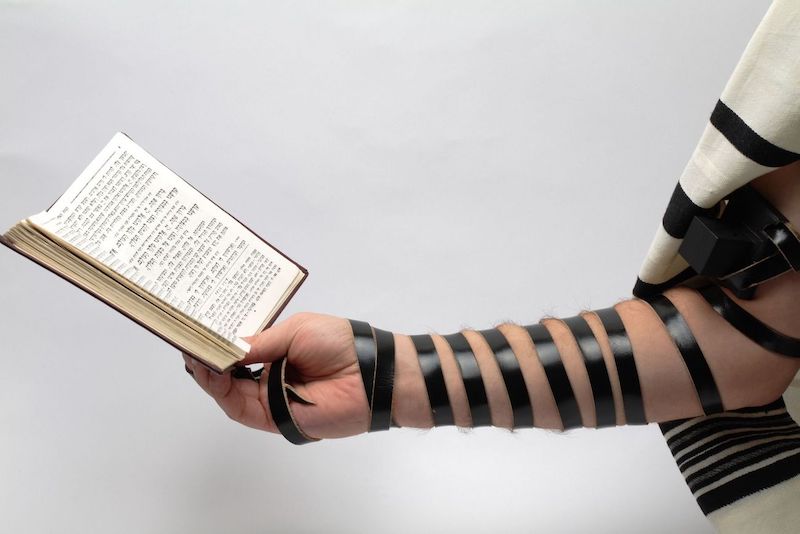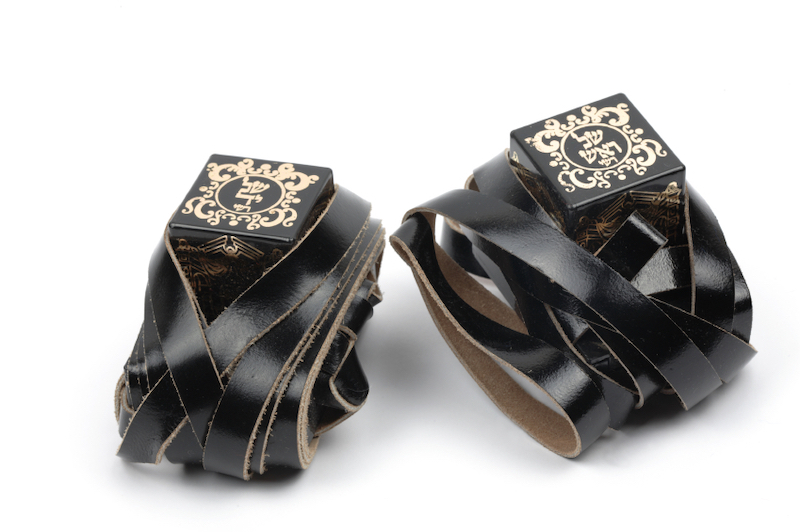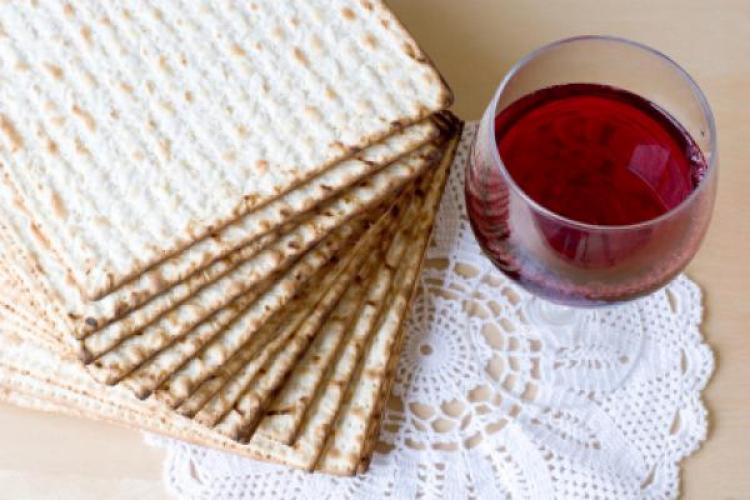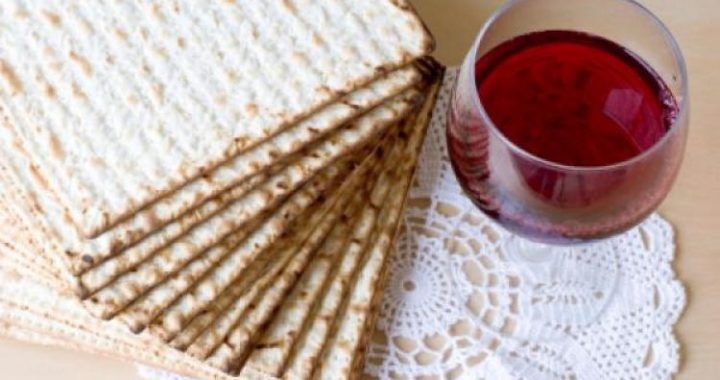I recently took an overnight flight from New York City to Tel Aviv. Midway through the flight, like clock work, orthodox Jewish men began to drape themselves with a tallit (a four-cornered garment used in prayer), wrap their arms and forehead with tefillin (leather straps and a small black box containing Scripture portions), and perform Shacharit (traditional Jewish morning prayers). Why do Jewish men pray in this manner?

Jewish Prayer
I was literally reading this week’s Torah Portion (Ex. 10:1-13:16) during this flight to Tel Aviv and I was reminded of the source for the Jewish tradition of literally binding God’s Word to one’s hand and one’s forehead through the interpretation of the instructions that God gave to the Israelites through Moses. At the time of the Exodus from Egypt, the LORD emphasized to the Israelites the continual practice of dedicating to the LORD all of the firstborn of the womb, of both animals and humans, as well as the yearly observance of Passover (Ex. 13).
Tefillin – The Binding of God’s Word
In Exodus chapter thirteen we read of how the Israelites were to continually keep the Passover year by year (Ex. 13:3-7). Moses then went on to explain the reason for this command of keeping the Passover:
You shall tell your son on that day, saying, ‘It is because of what the LORD did for me when I came out of Egypt.’ And it shall serve as a sign to you on your hand, and as a reminder on your forehead, that the law of the LORD may be in your mouth; for with a powerful hand the LORD brought you out of Egypt. Therefore, you shall keep this ordinance at its appointed time from year to year. – Ex. 13:8-10
And in regard to the sacrifice (or redemption) of the firstborn we read the following explanation:
It came about, when Pharaoh was stubborn about letting us go, that the LORD killed every firstborn in the land of Egypt, both the firstborn of man and the firstborn of beast. Therefore, I sacrifice to the LORD the males, the first offspring of every womb, but every firstborn of my sons I redeem.’ So it shall serve as a sign on your hand and as phylacteries on your forehead, for with a powerful hand the LORD brought us out of Egypt. – Ex. 13:15-16
It is based on the foundation of these verses together with Deuteronomy 6:8 that the rabbis have prescribed the precise manner in which orthodox Jewish men are to daily pray with tefillin (leather straps and a small black box containing Scripture portions, also called phylacteries). Have the rabbis correctly interpreted these Scriptures? What did God intend for His people regarding the keeping of Passover and the dedicating to the LORD of the firstborn of the womb?

The Sign On The Hand & Forehead
In studying these verses in context, it seems evident that God intended His people to continually observe the Passover and the dedication of the firstborn as a physical reminder, that which is done with the hands and seen with the eyes, as well as a spiritual reminder, that which is proclaimed in words by the speaking of the mouth in accordance with one’s inner conviction. It is this combination of the physical action and the deeper spiritual meaning which appear to be God’s main intent.
Whereas Judaism focuses on the literal binding of God’s Word to one’s hand and on one’s forehead in prayer, I would argue that God has instructed His people to perform certain actions and observances (i.e. Passover and the dedication of the firstborn) with the intent that when His people do these actions they are remembering what God has done in the past and proclaiming who He still is today. For a more in-depth study into the meaning of tefillin in Jewish prayer and God’s original intent according to the Hebrew Scriptures, read this article: The Appointed Signs of God
The New Testament Observance
Since Yeshua was crucified on the very day of Passover, we see a direct connection to how God commanded His people under the Old Covenant regarding the observance of Passover with the observation of the continual reminder of the sacrifice of Yeshua in the New Covenant:
For I received from the Lord that which I also delivered to you, that the Lord Yeshua in the night in which He was betrayed took bread; and when He had given thanks, He broke it and said, “This is My body, which is for you; do this in remembrance of Me.” In the same way He took the cup also after supper, saying, “This cup is the new covenant in My blood; do this, as often as you drink it, in remembrance of Me.” For as often as you eat this bread and drink the cup, you proclaim the Lord’s death until He comes. – 1 Corinthians 11:23-26
Yeshua is the firstborn Son of God and He was crucified as the Passover Lamb on the very day of Passover. As we partake of communion by eating the bread and drinking the wine, we are doing something physical with our hands and proclaiming the Word of God with our mouths in regard to the redemption that we have obtained through the body and blood of Yeshua.

Elements of Faith
It is the combination of the physical act of taking the bread and wine together with proclaiming the death and resurrection of Yeshua that we testify to who God is: that which He has done in the past, that which He is doing in the present, and that which He will do in the future. Our words and actions must work together as an expression of our faith:
But what does it say? “The word is near you, in your mouth and in your heart”—that is, the word of faith which we are preaching, that if you confess with your mouth Yeshua as Lord, and believe in your heart that God raised Him from the dead, you will be saved; for with the heart a person believes, resulting in righteousness, and with the mouth he confesses, resulting in salvation. – Romans 10:8-10
Mere words and physical actions without an internal conviction of the heart are empty and meaningless. It is the convergence of one’s actions and words from the inner conviction of the heart that produce true faith and salvation.
Shabbat Shalom!
If you enjoyed reading this article, share it today with friends! We also invite you to sign up for our weekly Torah Portion commentary on the sidebar to the right.
Help keep our weekly commentaries free and available to all. Click here to donate today:
*All Scripture take from NASB Copyright © 1960, 1962, 1963, 1968, 1971, 1972, 1973, 1975, 1977, 1995 by The Lockman Foundation


